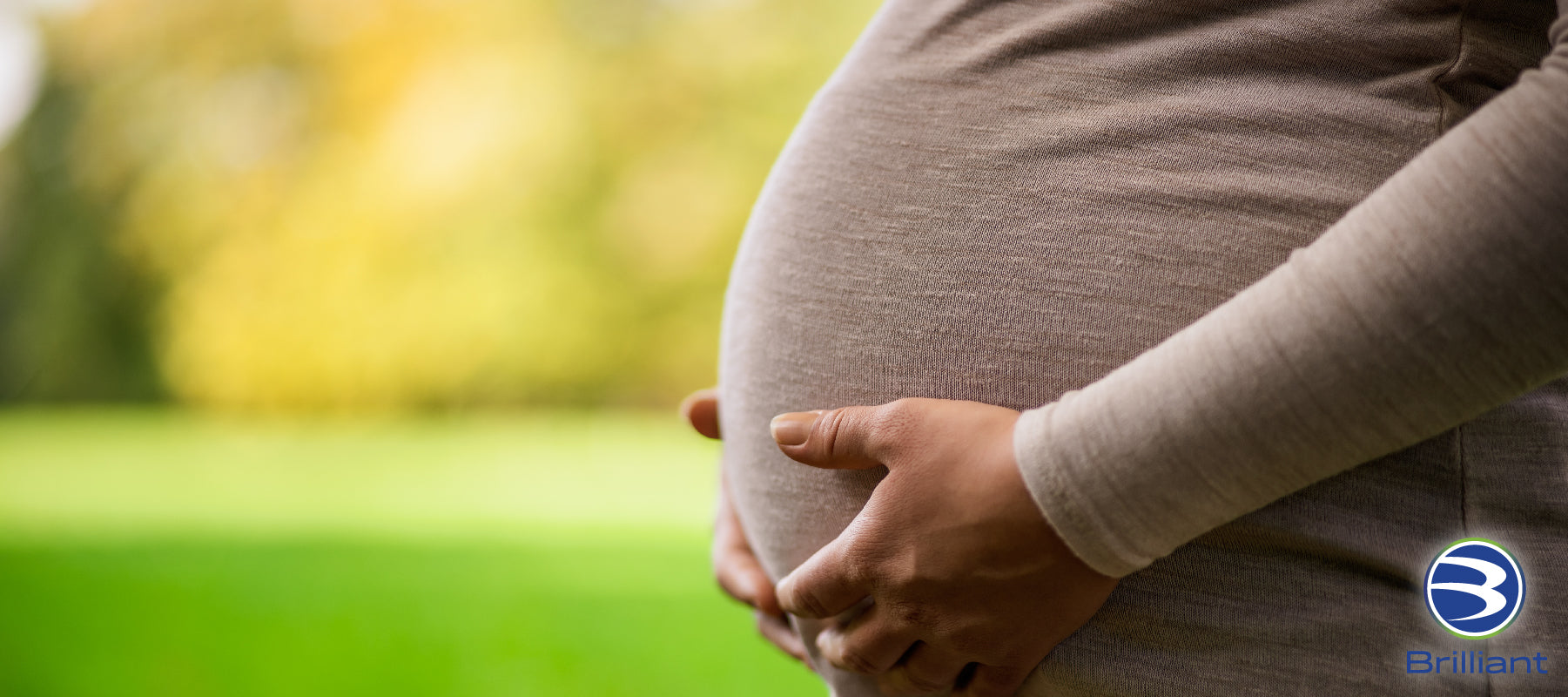- Phone: 1.404.373.4030
- Opening Hours: Mon-Fri 9AM-5PM Eastern

DISCLOSURE: Noelle Copeland RDH is the oral care specialist and dental consultant to the Brilliant and Baby Buddy oral care lines.
The prevalence and severity of gingival inflammation in pregnancy can be mild and not related to plaque accumulation, meaning the teeth are clean and the gums are just swollen because of the hormonal changes that are taking place. These changes increase blood flow to the gums and also change how the body responds to oral bacteria, causing sensitive, irritated, and swollen gums.
Pregnancy gingivitis is a common occurrence for many women during pregnancy. Hormones play a big factor in how our body responds to the bacteria and pathogens in the mouth. An expectant mom can change little to nothing about her oral care but suddenly experience sensitive and bleeding gums that she has not experienced before.
During pregnancy, an increase in the production of the hormone progesterone will cause the mother’s response to plaque and bacteria in her mouth to be exaggerated. However, gingival inflammation can also be caused by excessive plaque and bacteria in the mouth, making gingivitis more severe. In fact, if you have gingivitis before getting pregnant, you are at risk that pregnancy will increase the severity of it.
Pregnancy gingivitis and regular gingivitis experienced outside of pregnancy, are pretty much the same in the scope of treatment and prevention. The way to treat pregnancy gingivitis is with extra attention to everyday home care routines. Additionally, be sure to visit the dentist for a professional dental cleaning and evaluation.
Periodontal disease is an active infection in the mouth, having a direct effect on the teeth and the supporting structures they sit in; the bone, ligaments, and gum tissues. Periodontal disease is NOT reversible. It can be treated and health can be restored, but the damage it does to the teeth, gums, and bone is permanent. Once the pathogenic bacteria starts to erode the bone that teeth are securely sitting in, the body does not regenerate that bone.
When pathogenic bacteria is left undisturbed in the mouth it causes an array of issues from mild to severe gingivitis, active periodontal disease, to decay and cavities. For pregnant women, that bacteria travels in the bloodstream throughout the body, with the ability to transmit and colonize the placenta. In fact, preterm low birth weight babies are a risk factor to mothers who have chronic periodontal disease that goes untreated before and during their pregnancy.
Your baby’s oral health and your pregnancy are intricately connected. Did you know that during the third and sixth months of pregnancy, children’s primary baby teeth begin forming and mineralizing? What you eat during pregnancy affects the growth of your unborn child in every way, including the development of baby teeth.
Calcium & Phosphorus are essential for strong teeth and bones and need to come from the mother’s diet in an adequate supply. If an expectant mother doesn’t get enough calcium in her diet to support the pregnancy, the body will pull it from the mother’s bones to give the baby what it needs. OUCH!
Phosphorus, another mineral that accounts for the hardness of teeth is found in many high protein sources such as meat and milk. Vitamin D helps the body absorb and retain calcium and phosphorus. However, very few foods contain Vitamin D naturally. Vitamin D is produced in the body when the skin is exposed to direct sunlight. An expectant mother should be taking prenatal vitamins to help supplement the vitamins, minerals, and nutrients she needs while pregnant.
Baby teeth begin to appear in the mouth between 4-8 months of age for most children. Starting at 3 months of age, babies will begin to teethe in preparation for the baby teeth to break through the gums. Most children develop a full set of 20 baby teeth by the age of 3 years. But don’t wait until the first baby tooth comes in to start oral care, start oral care from the very beginning!
Early Oral Care
Oral Care at home
Oral health during pregnancy is important because it works to directly support systemic health. Brushing your teeth while pregnant, and supporting your oral health through regular and effective oral care routines is the best start to foundational oral care. Talk to your dentists about any challenges you may encounter or questions you may have about taking care of your mouth.
© 2021 Compac Industries. All rights reserved.
This article is intended to provide an understanding of and knowledge about “oral health topics” as expressed through the perspective and experience of the author. It is not intended to be a substitute for professional advice or counsel, including the diagnosis or treatment of any condition. Always seek the advice of your dentist or another qualified healthcare provider with any questions you may have regarding a medical condition, an oral condition, illness, or treatment of any listed or nonlisted situation above. By using this site, you signify your assent to our Terms and Conditions. If you do not agree to all of these Terms and Conditions, do not use this site.
Noelle Copeland RDH is an Oral Care Specialist and Dental Consultant who provides content for Brilliant Oral Care and Baby Buddy.


DISCLOSURE: Noelle Copeland RDH is an Oral Care Specialist and Dental Consultant who provides content

DISCLOSURE: Noelle Copeland RDH is an Oral Care Specialist and Dental Consultant who provides content

We believe that all people are fearfully and wonderfully made and designed in the womb for a grand purpose.
Useful Links
Copyright © 2023 Compac Industries | All Rights Reserved.